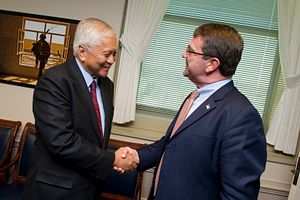The next Philippine president should stay the course in the country’s handling of the South China Sea dispute, former Philippine foreign secretary Albert del Rosario told an audience late last week.
Del Rosario, a distinguished diplomat who retired last month after five years as head of the foreign service, was known for his activism on the South China Sea issue during the administration of President Benigno Aquino III (See: “Philippines’ Top Diplomat Resigns With South China Sea Verdict Looming”). With a new president expected to be elected in upcoming elections in May and a verdict on the Philippines’ case against China with the United Nations Permanent Court of Arbitration at The Hague looming, questions have been raised about whether the next administration would depart from the country’s current South China Sea approach.
Asked about his advice for an incoming administration during a luncheon hosted by the Makati Business Club last Friday, del Rosario said it should continue on with the Philippines’ current South China Sea policy. He said that a recent survey had confirmed the fact that defending the country’s maritime sovereignty ranked as one of the top issues Filipinos felt the Aquino administration had handled well.
“The next administration should consider staying the course because apparently the people have approved of the foreign policy that we have embraced,” he said.
Del Rosario also stressed the importance of the tribunal coming to a decision soon given recent Chinese actions in the South China Sea – including island-building activities and construction as well as ongoing militarization – which had “seriously heightened tensions.”
Those actions, he said, “further highlight the urgency of an early promulgation of the decision.” Del Rosario had earlier said that the Philippines was expecting a ruling in May.
Despite the fact that China has said that it rejects the case, del Rosario said that the decision would be legally binding.
“The Philippines maintains that the decision of the tribunal, once rendered, will be legally binding and should be accorded due respect by everyone. We are enjoining other nations to help us to convince China to respect the rule of law,” he said.
He also said that the proposal for joint development of the South China Sea between the Philippines and China – which presidential candidate Jejomar Binay had publicly mentioned and stirred controversy – could be considered as long as this is in accordance with the rule of law.
As I noted in an earlier piece, del Rosario was replaced last week by Jose Almendras, the secretary to the cabinet, after he had resigned for health reasons (See: “Philippines Appoints New Foreign Secretary”). Almendras will serve as ad interim foreign secretary for the next few months.

































